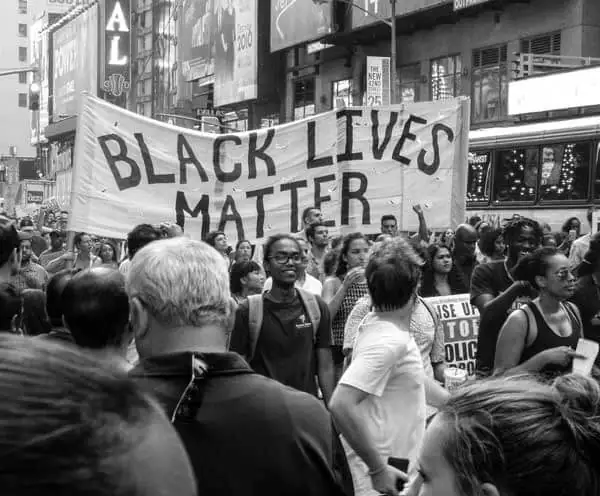
With the events over the last couple of weeks in the United States, anti-black racism and the pain and suffering it causes has been brought to the forefront. I have been perseverating since the protests started, as I wanted to write something that represents my thoughts and make clear Sageview Health’s position. I have struggled to find the right words, not wanting to say the wrong thing, and nothing got written. In the end, I’m hopeful that saying something is better than remaining silent, even if I make a few mistakes along the way.
Sageview Health’s Commitment
Sageview Health recognizes the impact that overt and systemic racism has on individuals in our community. We know that the systemic disparities that exist in our country have real and substantial economic, social, health, and mental health costs for those disadvantaged by the system, including black, brown, and indigenous communities. We recognize our responsibility to fight racism and discrimination in all its forms, and commit to our employees, partners, and the community we serve to not be complacent. We will continue to educate ourselves, ask questions, invite feedback, have difficult conversations, reach out to community partners and activists, and do what we can to foster empowerment and to support the mental health of those impacted by racism and discrimination. We will make mistakes and we will learn from those mistakes.
A Note on My (White) Privilege
At times over the last couple of weeks I have felt overwhelmed with emotion while watching the news or scrolling through my news feed. Seeing the tremendous sadness, pain, and anger of the African-American and African-Canadian communities triggered my own feelings of sadness and anger. At times I have been tempted to turn it off and ignore what is happening. My privilege would allow me to do this. I could turn it off and not experience, or be confronted by, those painful emotions. Of course black, brown and indigenous men and women do not have this option. This is a truth that I have always known, but it has stuck with me to a greater extent during this moment in time than at any other time in the past.
I have always seen myself as an ally against racism and progressive in my social views. In the past, I have been outraged by media accounts of black men dying at the hands of police. In all honesty, however, this outrage would last a few days (as long as the news cycle), and then faded into the background of my busy life. This is one of the more salient examples of my white privilege. Police brutality and inequality are not part of my lived experience, so it can fade into the background and not impact me on a daily basis.
I am the embodiment of privilege in our society – middle class, white, heterosexual, male. I have been afforded opportunities that most have not, simply by being born as I am. This concept of privilege is not new to me, and I feel I have understood it well. The system is set up for me to succeed. I have never been followed in a store, never been stopped by the police without reason (2 speeding tickets and an expired plate sticker), never had difficulty renting an apartment, never felt others question my accomplishments, never been blamed by others for their failed accomplishments. My ancestors were not stolen from their homes by white men and sold to other white men. My great-great grandparents were not freed from slavery, because they were always free. I have never felt apart from the society in which I live. This is my privilege.
A Note on Your White Privilege
Why is it so difficult for those with privilege to acknowledge it? I have thought about this a great deal, and here are a few reasons why I believe this to be the case.
- I am not racist. Although this may be the case, systemic racism and white privilege is not about your individual behaviour and beliefs. It is about a system that affords you subtle and not so subtle advantages (e.g. not having the threat of unjust police detainment, that could result in your death) that frankly makes life easier. That is your privilege.
- My life is not perfect, it does not feel that I get special privileges. Very true, our privilege does not mean that we are immune from the full range of human emotion and loss. We all experience struggles, sadness, anger and failure in our lives. However, having these very real struggles and pain in our lives does not mean we do not have privilege. It simply means that we do not have the extra layer of pain, suffering, and struggle that results from a system and society built by and for white people. That is your privilege.
- My accomplishments are my own and the result of hard work. True, you worked very hard and your accomplishments are your own. It is difficult to hold these two notions at the same time, but that is the reality. We work hard for our accomplishment, and we do so within a system that was built by and for people like us. That is your privilege.
Confronting our privilege is uncomfortable, seeing the pain and suffering of those oppressed is uncomfortable. Sometimes it feels there is nothing we can do about, so why try? It would be easier and less painful to just turn off the news and go about our lives. This is true, and it is an individual question for all of us with privilege. We can start by clarifying how we want to see ourselves in a couple easy questions:
“In this moment of pain and suffering, what do you want to stand for?”
“Ten years from now, when these protests are a distant memory, what do you want to have stood for in this difficult time.”
Once you decide what you want to stand for and who you want to be in this moment, you can decide on the actions to take to live consistently with those values. We won’t always be living 100% consistent with our values, but we can strive to be. I know I will strive to not tune out and not be complacent.
Readings on Racism and White Privilege
“Stamped:Racism, Antiracism, and You” by Jason Reynolds and Ibram X. Kendi
“How To Be An Antiracist” by Ibram X. Kendi
“White Fragility: Why It’s So Hard For With People to Talk About Racism” by Robin DiAngelo
“21 Things You May Not Know About The Indian Act: Helping Canadian Make Reconciliation with Indigenous Peoples a Reality” by Bob Joseph
“Between The World and Me: Notes On The First 150 Years In America” By Ta-Nehisi Coates
There are several Canadian organizations you can get involved with, get information from or donate to:
Find your way
Our clinicians provide safe, compassionate support to help people manage mental health challenges using evidence based approaches including CBT, DBT, and ACT.
